Worldwide, 40% of all primary energy is used in buildings. While in our countries this is mostly achieved with fossil fuels. In different ways, both patterns of energy consumption are environmentally intensive, contributing to global warming. Without proper policy interventions and technological improvements, these patterns are not expected to change in the near future.
The pattern of energy use in buildings is strongly related to the building type and the climate zone where it is located. The level of development also has an effect. Today, most of the energy consumption occurs during the building’s operational phase, for cooling, heating and lighting purposes, which urges building professionals to produce more energy-efficient buildings and renovate existing stocks according to modern sustainability criteria.
The diversity of buildings, their distinct uses, and extended life cycle pose a challenge for the prescription of energy conservation measures. Specific solutions are needed for each situation, such as for the construction of new buildings, for the renovation of existing ones, for small family houses and for large commercial complexes. Energy consumption can be reduced with thermal insulation, high-performance windows, and solar shading, airtight structural details, variable speed cooling heat pump systems, supported with the integration of renewable energy production in the building.
These strategies apply to buildings in both warm and cold climates. Site and energy chain planning also influence the energy efficiency of the individual building. However, technological solutions will only be helpful when building occupants are committed to using energy-efficient systems in an appropriate way. There are many factors that influence the energy consumption behavior of individuals, such as gender, age, and socio-demographic conditions. Educational and awareness raising campaigns are therefore crucial in the process of ensuring the energy efficiency of buildings.
The end of the functional service life of a building may inhibit renovation projects – when the building or its parts are no longer suitable for the needs of the building user. In refurbishment processes, basically, the same rationale applies as in the construction of new buildings. Since the operational energy is the major cause of greenhouse gas emissions in residential or commercial buildings to be renovated, this should be the first aspect to be taken into account when considering the improvement of the energy efficiency of building stocks. Moving towards the idea of life-cycle responsibility and introducing effective commissioning processes will help to ensure the efficient life-cycle performance of the building. The high investment costs involved, the lack of information on energy-efficient solutions at all levels, as well as the (perceived or real) lack of availability of solutions to specific conditions, are considered as the major barriers to implementing energy efficiency measures in buildings. In addition, there can be a number of organizational barriers, such as different decision-making levels, privatization/deregulation processes, different stakeholders deciding on the energy system and shouldering the energy bill respectively, etc. It is clear that there are no universal solutions for improving the energy efficiency of buildings. General guidelines must be adjusted to the different climate, economic and social conditions in different countries. The local availability of materials, products, services and the local level of technological development must also be taken into account. The building sector has a considerable potential for positive change, to become more efficient in terms of resource use, less environmentally intensive and more profitable.
Decision makers, stakeholders, and experts should understand the logic behind the behavior of building industry and that is important for successful development and deployment of proper technologies. Providing benchmarks on sustainable buildings is an essential requirement for decision makers to take the correct call of action to encourage energy efficient buildings. Solutions aiming to improve the energy efficiency of buildings and construction activities should be disseminated widely, making use of existing or new technology transfer programs. Influencing market mechanisms and encouraging research and development projects, as well as public-private partnerships, are of paramount importance for this endeavor.
The energy efficiency opportunities in the construction process and in buildings are undertaken, including building materials, envelope design, energy supply, human behavior and site and energy chain planning. The focus will be put on the operational phase of the building and on solutions that have been demonstrated in full scales, such as pilot facilities or commercial applications. A movement on the land is powered by 365Ecology to create the first community in Egypt collecting all stakeholders and experts to discuss everything related to energy efficient buildings.
The vision for the “Building of Tomorrow” is our motive to change the industry of the building construction and make a real impact that helps to renew the industry, make an improvement in the market, increase the awareness and enhance the worker’s experience.

